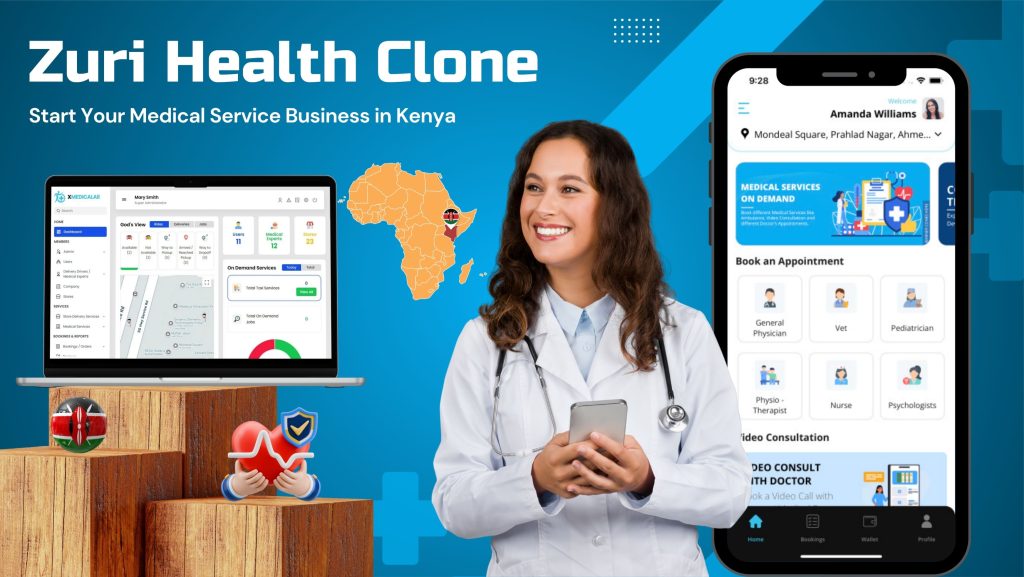
Kenya’s healthcare world is changing, and quickly too. People are busy, roads are sometimes bad, and waiting at clinics can be exhausting. Healthcare service providers app like Zuri Health have made it easier for people to get doctors, lab tests, even medicines, without leaving their homes. Now, if you’re thinking of starting your own Zuri Health clone, it’s not just about copying, it’s about understanding what people need and giving them something useful. Something real.
The first thing you notice about medical services app like Zuri Health is that they make life easier. And that’s really the point, isn’t it? Your app should make people feel like, “Okay, I can actually take care of my health without extra stress.” That means consultations, lab tests, medicines, and maybe even home visits. People love convenience.
Start With the Basics
Before adding fancy stuff, start with the basics. People want doctors they can reach fast. So, online consultations, video, voice, or even chat, are the core. Some people prefer video because they can see the doctor, others just chat because they are in a noisy place or have slow internet. Offering options is important, even if it seems small.
Next, lab tests. Lots of people hate going to labs. Waiting forever, paperwork, travel… you know the drill. Your medical services app can let users book tests, and then a professional comes to collect the sample from their home. Simple, but trust me, it makes a huge difference. It also makes your app feel modern and useful. People notice things like this.
Medication delivery app is another must. People finish a consultation, they get a prescription, but maybe the pharmacy is far away. If your app can deliver their medicines straight to the doorstep, you just earned trust points. And it’s convenient. Convenience equals loyalty, most of the time.
Some users might need home visits too. Elderly, sick, or just someone who cannot travel, home visits show that your app cares. Even if it’s just a few visits a day at first, it sets your platform apart. People remember this.
And yes, SMS support. Not everyone has a smartphone or reliable internet. If they can still access some services via SMS, that’s a big win. It makes your mobile health service app inclusive, which, in Kenya, can make all the difference.
Technology Stack That Works
You don’t need to be a tech genius, but knowing the basics helps. For building the app, frameworks like React Native or Flutter are good. Why? Because they work for both iOS and Android. Saves time. Saves money. And you don’t need two separate teams.
Backend stuff? Node.js with Express is solid. Handles requests fast. Keeps data flowing smoothly. For storage, MongoDB or PostgreSQL works. These can handle lots of users, lots of bookings, and grow with your app.
SMS integration is crucial. Twilio or Africa’s Talking can do the trick. People without smartphones still feel included. And payment, M-Pesa is king in Kenya. Integrate it. People trust it. Maybe Stripe too for others.
It’s not flashy, but without this tech, your app won’t survive no matter how sleek the design is.
User Interface Should Be Simple
Don’t overthink design. People want to book a doctor, book a test, or order meds in as few taps as possible. Clean screens. Big buttons. Clear instructions. That’s it.
Push notifications help, but don’t spam. Remind users of appointments, deliveries, or lab results. That’s helpful. Too many notifications? Annoying. They might uninstall.
Accessibility is important. Some users may be older or not used to smartphones. Bigger fonts, clear icons, simple language. Makes people happy. Keeps them coming back.
Security Is Not Optional
Health data is sensitive. Users need to trust you. SSL/TLS encryption is basic, but essential. Multi factor authentication adds another layer. Users feel safer.
And follow Kenya’s data protection laws. Don’t skip this. People care. And if you get this wrong, you could get fined or lose trust fast. Build security in from the start.
Partnerships Make It Real and Profitable
You can’t run this alone. Doctors, pharmacies, labs, they are your backbone. Licensed doctors for consultations are a must. People need credibility.
Pharmacies help with medicines. Labs help with tests. Insurance providers? Optional at start, but later, integrating them can make your healthcare service providers app more appealing. Users like options.
It’s not complicated, but building real relationships with partners takes effort. You can’t automate trust.
Do Not Overlook Marketing, It is Extremely Important
Marketing is tricky, but don’t over complicate. Social media is your friend, Facebook, Instagram, Twitter. Highlight convenience, reliability, and safety. People notice that.
Referral programs work too. Offer small incentives. People invite friends. Word of mouth is gold.
Also, engage with the community. Health talks, small events, webinars. Shows you care. Makes your app feel like part of the city.
Monitor, Make Adjustments, See Results, Repeat
App launched? Great. But don’t relax. Watch how users behave. Track what works, what doesn’t. Collect feedback. Fix bugs fast. Update features.
Analytics tools show user behaviour, where people drop off, which features are popular. Use this data. Keep improving. It’s never finished.
Keep It Human
Remember, healthcare is human. Your app should feel human too. Fast, simple, reliable. Not perfect, but practical. Mistakes will happen, crashes, delays, cancellations. Fix them quickly. Listen to users. Talk to drivers or doctors if needed.
Small touches make a big difference. Friendly messages, easy navigation, helpful support. People notice these things, trust me.
Conclusion
Starting a Zuri Health clone in Kenya isn’t easy, but it’s possible. Focus on the core: consultations, lab tests, medicines, home visits, SMS support. Build it on solid tech. Keep security tight. Form partnerships. Market wisely. Listen and improve. If you do all that, your mobile health service app can really make healthcare easier for Kenyans. People will use it. Trust it. Come back. And that’s what matters most.